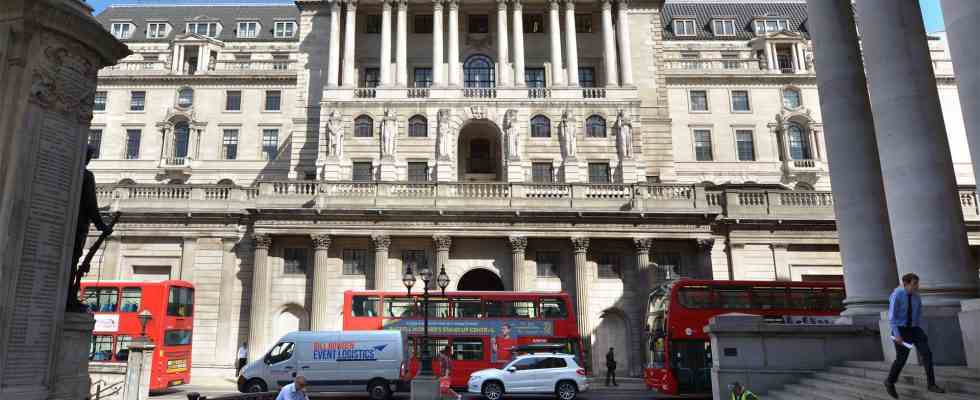Status: 03/23/2023 2:59 p.m
After the ECB and the Fed, the Swiss National Bank, the Bank of England and the Norwegian central bank are also raising interest rates. Despite market turbulence and the banking crisis, inflation remains in focus.
This week’s central bank decisions leave no doubt that, despite the banking crisis, monetary policy is primarily focused on combating inflation. In the morning, the Swiss National Bank SNB raised the key interest rate by a significant 0.5 percentage points to 1.5 percent. Around noon, the Bank of England followed suit with a quarter-point hike in interest rates to 4.25 percent.
And yesterday the US Federal Reserve (Fed) raised its interest rate by a quarter of a percentage point to the new range of 4.75 to 5.0 percent. The aim of these measures by the central banks is also to strengthen the markets’ confidence in the stability of the financial system.
A waiver of interest rate increases could have been taken by the market players as a signal that the situation on the financial markets is more serious than expected, despite all statements to the contrary.
“Fight inflationary pressures now”
In view of the current events in the banking sector, some investors had certainly hoped that the Fed in particular would pause interest rates. In view of the unfolding events in the Swiss banking system, which may have come to a temporary end with the takeover of the ailing Credit Suisse by its competitor UBS, some investors are likely to have speculated on a cautious SNB there too.
The head of the Swiss central bank, Thomas Jordan, defended the sharp increase in key interest rates despite the recent turbulence. “Of course, we also assessed the situation on the international financial markets, the uncertainty that is currently in the banking system,” said Jordan. “But we have come to the conclusion that a rate hike will not have a negative impact here.”
On the other hand, if the inflationary pressure were not countered with the necessary tightening of monetary policy, “we will have a bigger problem later on,” explained Jordan. An interest rate break was not an issue. “You have to fight the inflationary pressure now.”
“A strong signal”
The decision of the SNB is a strong signal, comments Commerzbank economist Christoph Weil. “In view of the recent market turbulence, this was not a matter of course,” emphasizes the expert.
Chief economist Thomas Gitzel from VP Bank points out that the Swiss National Bank also provides liquidity support in Swiss francs and foreign currencies on a large scale. “This means that the SNB has put emergency mechanisms in place that allow it to continue to tighten interest rates on the other side.”
Jordan also commented explicitly on the Credit Suisse cause: “The takeover of Credit Suisse by UBS is a done deal.” Further liquidity supports are not necessary. “Right now the liquidity tools are very large, they are very bold. I think that should be enough to ensure this transaction goes smoothly.”
Controversial decision
The interest rate hike by the Bank of England (BoE) also wants to leave no doubt about the goal of combating inflation. As expected, it raised the key interest rate for the eleventh time in a row. The inflation rate in the UK is currently 10.4 percent. However, against the background of the recent turbulence in the global financial sector, the decision was controversial internally: the proponents prevailed with seven votes to two.
Against the backdrop of the recent banking turmoil in the US and Europe, the central bank said UK banks were resilient and in good shape. The financial institutions also had sufficient capital and liquidity.
Given the inflation, despite the events of the last few weeks, the BoE has little choice but to hike rates again,” commented Craig Orlam, market watcher at broker Oanda.
Norway goes along
The Norwegian central bank also raised the key interest rate from 2.75 to 3.0 percent in the fight against high inflation. At the same time, the central bank signaled that it will probably step up despite the uncertain economic outlook: “If things go as we now expect, the key interest rate will be raised further in May,” said central bank chief Ida Wolden Bache.
Norway’s core inflation, which excludes energy prices and taxes, fell to 5.9 percent in February. However, it is still a long way from the central bank’s target of 2.0 percent.
Turkey’s central bank leaves interest rates unchanged
Although inflation in Turkey was still 55 percent last month, the Turkish central bank is pursuing a course that economists consider to be the wrong recipe in view of an inflation rate of 85 percent at times: it has continuously lowered the key interest rate.
Last year, it lowered the base rate in several steps from 14.0 to 9.0 percent in order to counteract the economic downturn. President Recep Tayyip Erdogan has repeatedly described himself as an “interest enemy” and urged the central bank to lower interest rates.
In today’s decision, she left the key interest rate at the current 8.5 percent. In February, the central bankers lowered the key interest rate again from 9.0 percent to the current level shortly after the severe earthquake in the south-east of the country.

